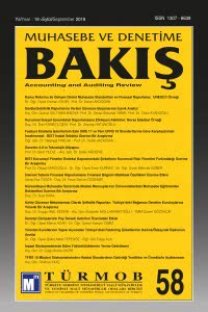MUHASEBE TEORİLERİ ÜZERİNE BİR İNCELEME
Bu çalışma ile muhasebe işleyişi üzerinde etkili olan muhasebe teorileri genel hatları ile incelenecektir. Bu bağlamda teori oluşturma yaklaşımı ele alınacak, çeşitli muhasebe teorileri üzerinde durulacak ve ardından bu muhasebe teorilerinin özellikleri ve birbirlerinden ayrılma noktaları belirlenecektir. Ardından muhasebede standartkoyma ve düzenleme yapma konusuna muhasebe teorileri üzerinden bakılmaya çalışılacaktır
Anahtar Kelimeler:
Muhasebe, Teori, Muhasebe Teorileri, Standart Koyma
AN ANALYSIS ON ACCOUTING THEORIES
In this study, accounting theories that are effective on operations of accounting is analyzed. With this aim, theapproach of constructing theory is analyzed, various accounting theories are discussed and characteristics anddifferences of theories is determined. And then standardizations and regulations are considered over the accounting theories
Keywords:
Accounting, Theory, Accounting Theory, Standardization.,
___
- Akdoğan, N. ve Aydın, H. (1987). Muhasebe Teorileri, Gazi Üniversitesi İİBF Yayın No: 44, Ankara Üniversite- si Basımevi, Ankara.
- Arslan, A. (2001). Felsefeye Giriş, Vadi Yayınları, Ankara.
- Belkaoui A.R., 1993, Accounting Theory, Academic Press, UK.
- Collin, Y., Tagesson, T., Andersson, A., Cato, J. ve Hansson, K. (2009). Explaining The Choice of Accounting
- Standarts in Municipal Corporations: Positive Accounting Theory and Institutional Theory as Competitive or Concurrent Theories, Critical Perspectives on Accounting, 20(2), :141-174. Durocher, S., Fortin, A., ve Cote, L. (2007). Users’ Participation in The Accounting Standart-Setting Process: A
- Theory-Building Study, Accounting Organization and Society, 32 (1-2):29-59. Evans, G.,T. (2003). Accounting Theory Contemporary Accounting Issues, Thomsan South-Western, USA.
- Gökdeniz, Ü., A. (2005). Muhasebe Uygulamalarındaki Uluslararası Farklılıklar ve Çözüm Önerisi, Avcıol Basım Yayım, İstanbul.
- Hakansson, H., N. (1981). On The Poltics of Accounting Disclosure and Measurement:An Analysis of Economic
- Incentives, Journal of Accounting Research, Vol.19 Supplement:1-35. Hendriksen, E. (1977). Accounting Theory, Third Edition, Richard D. Irwin, Inc., USA.
- Hitz, M., H. (2007). The Decion Usefulness of Fair Value Accounting- A Theoretical Perspective, European Ac- counting Review,16(2): 323-362.
- Johansson, S. ve Östman, L. (1995). Accounting Theory Integrating Behaviour and Measurement, Pitman Pub- lishing, GB.
- Malcolm, S. (2003). Research Methods in Accounting, Sage Publications, London (http://site.ebrary.com).
- Ryan, C., Guthrie, J. ve Day, R. (2007). Politics of Financial Reporting and The Consequences for Public Sector, Abacus, 43 (4): 474-487.
- Schroeder, R., Clark, M. ve Cathey, J. (2005). Eighth Edition, Financial Accounting Theory and Analysis, Wiley Corp. USA.
- Scott, W. R. (2006). Financial Accounting Theory, Fourth Edition, Pearson,Prentice Hall, Toronto.
- Underdown, B. ve Taylor, P. (1985). Accounting Theory and Policy Making, Heinemann Publishing, London.
- Üstündağ, S. (2000). Muhasebe Standartları Oluşturulma Süreci, Muhasebe ve Denetime Bakış, Sayı:1.
- Wolk, H., Francis, J. ve Tearney, M. (1984). Accounting Theory A Conceptual and Institutional Approach, Kent
- Publishing Company, USA. Yayla, H., E. (2007). Disipline Edici Toplum ve UFRS:Bir Foucauldian Eleştirisi, Muhasebe Bilim Dünyası Der- gisi, Cilt.9 Sayı.4.
- Zeff, S., A. (1978). The Rise of “Economic Consequences”, The Journal of Accountancy, December.
- ISSN: 1307-6639
- Yayın Aralığı: Yılda 3 Sayı
- Başlangıç: 2000
- Yayıncı: TÜRMOB
